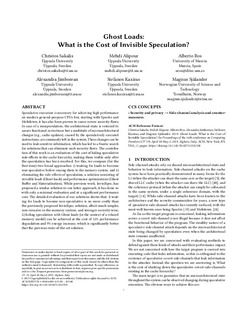| dc.description.abstract | Speculative execution is necessary for achieving high performance on modern general-purpose CPUs but, starting with Spectre and Meltdown, it has also been proven to cause severe security flaws. In case of a misspeculation, the architectural state is restored to assure functional correctness but a multitude of microarchitectural changes (e.g., cache updates), caused by the speculatively executed instructions, are commonly left in the system. These changes can be used to leak sensitive information, which has led to a frantic search for solutions that can eliminate such security flaws. The contribution of this work is an evaluation of the cost of hiding speculative side-effects in the cache hierarchy, making them visible only after the speculation has been resolved. For this, we compare (for the first time) two broad approaches: i) waiting for loads to become non-speculative before issuing them to the memory system, and ii) eliminating the side-effects of speculation, a solution consisting of invisible loads (Ghost loads) and performance optimizations (Ghost Buffer and Materialization). While previous work, InvisiSpec, has proposed a similar solution to our latter approach, it has done so with only a minimal evaluation and at a significant performance cost. The detailed evaluation of our solutions shows that: i) waiting for loads to become non-speculative is no more costly than the previously proposed InvisiSpec solution, albeit much simpler, non-invasive in the memory system, and stronger security-wise; ii) hiding speculation with Ghost loads (in the context of a relaxed memory model) can be achieved at the cost of 12% performance degradation and 9% energy increase, which is significantly better that the previous state-of-the-art solution. | nb_NO |
